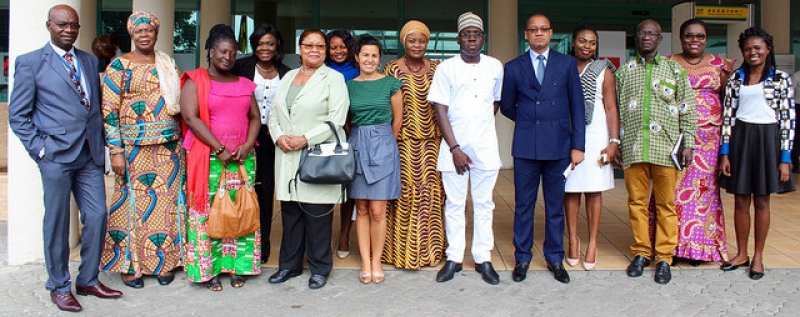Implementation of Human Rights Committee's recommendations in Ghana
Published on 08 Aug 2017, 12:03 PM
Human Rights Committee member visits Ghana to follow-up to the Concluding Observations adopted in July 2016
 Human Rights Committee member, CCPR-Centre and HRAC Delegation with members of the Parliament
Human Rights Committee member, CCPR-Centre and HRAC Delegation with members of the Parliament
After one year of the Human Rights Committee's adoption of the Concluding Observations on the initial report of Ghana, the Centre for Civil and Political together with the Human Rights Advocacy Centre and Ghana's Ministry of Foreign Affairs, organised a follow-up visit to Accra from 31 July to 3 August 2017.
The main objective of the visit was to continue the dialogue with the national authorities regarding the implementation of Committee’s Concluding Observations, with particular focus on the recommendations selected for the follow-up procedure of the Committee, namely:
- Discrimination against women and harmful traditional practices
- Stigmatisation and degrading treatment against persons with mental disabilities
- Conditions of detention and violence among inmates
"Harmful traditional practices in Ghana are not acceptable, we are taking measures to eradicate them"
- Ambrose Dery, Ghana's Minister of Interior
CCPR-Centre's Delegation meetings with key stakeholders
The Delegation of the mission was composed by Margo Waterval, Human Rights Committee member, and Andrea Meraz, Programme Manager at CCPR-Centre. Accompanied by Wendy Abbey, Technical Advisor at HRAC, the Delegation met with the following stakeholders:
- Minister of Interior
- Deputy-Minister of Foreign Affairs
- Chief State Attorney of the Minister of Justice and Attorney General's Department
- Commissioner and Human Rights Director of the Commission on Human Rights and Administrative Justice
- Director General of Ghana Prison Service
- Members of Parliament
- Deputy-Minister of Gender, Children and Social Protection
- Executive Secretary of the National Council of Persons with Disabilities
Additionally, the Delegation held interviews with journalists and a workshop with 26 civil society representatives to prepare a Plan of Action to monitor the implementation of the recommendations.
Discrimination against women and harmful traditional practices
Concerning harmful traditional practices such as female genital mutilation, the authorities reafirmed that Ghana is taking measures to eradicate them, working together with civil society and traditional leaders.
Authorities also informed the Delegation that several awareness-raising campaigns to prevent and eliminate child and forced marriages are also in place. Although it still remains a common practice in rural areas.
However, more efforts need to be paid to address the so-called "witch camps", where women suspected of witchcraft are sent to as they cannot live in their communities because they risk discrimination and persecution. As discussed during the dialogue in Geneva, the closing of these camps must be carried out along with holistic actions ensuring that these women are properly reintegrated back into society, including generating community awareness in order to stop this practice.
Another topic which remains to be addressed is polygamy, which the Committee considers to be a form of discrimination against women, whereas the State authorities regarded it as an accepted traditional practice.
Stigmatisation and degrading treatment against persons with mental disabilities
One of the most challenging issues addressed during this mission was the so-called "prayer camps", to which people with mental disabilities are sent to, given that mental health issues in Ghana are considered to be within the realm of the spirit. In this sense, people believe that the way to treat a mental health problem is by resorting to a prayer camp instead of medical treatment. The main concern is that prayer camps are not registered or monitored by the State despite allegations of human rights abuses which can amount to torture, including cases of shackling and forced fasting. Additionally, mental health facilities lack of qualified staff and medicines.
The authorites met during the mission said Ghana investigates any allegation of torture or ill-treatment in the prayer camps. However, they are not in a position to register or monitor the living conditions in these camps because they are runned by religious leaders.
Conditions of detention and violence among inmates
Ghana is making efforts to improve prison conditions and overcrowding, but recognises more needs to be done. One of the main topics of discussion during the meetings was the possibility of non-custodial sentences for minor crimes. This could help to reduce the number of prisoners on remand. Judges need more training to stop resorting to preventive detention without a proper case by case study.
Other issue clarified during the mission was the separation of juveniles and adults. On this regard, the Delegation was informed that previously any person under 18 who was sentenced had a three year detention at the juvenile correctional. While if the person was over 18 he/she could get a shorter sentence in an adult prison. This encouraged juveniles to lie about their age. Lack of birth certificates and birth registration contributed to this problem. However, this has been addressed by eliminating the mandatory three-year sentence for juveniles.
Follow-up procedure
As part of the follow-up procedure, the State committed to submit its follow-up report to the Human Rights Committee on the three above-mentioned recommendations by the end of August 2017.
Civil society organisations, under the lead of HRAC and supported by CCPR-Centre, will also submit a follow-up report in paralel of the State report.
 Human Rights Committee member, CCPR-Centre and HRAC Delegation with members of the Parliament
Human Rights Committee member, CCPR-Centre and HRAC Delegation with members of the Parliament

